The Key to Opening Your HVAC's Full Potential
Preventative hvac maintenance is the scheduled inspection, cleaning, and servicing of your heating and cooling system to keep it running efficiently and avoid unexpected breakdowns. Here's what you need to know:
What Preventative HVAC Maintenance Includes:
- Monthly tasks - Check and replace air filters, keep vents clear, clean around outdoor unit
- Seasonal tune-ups - Professional inspection of refrigerant levels, electrical connections, and ductwork (twice yearly)
- Annual deep maintenance - Thorough cleaning of coils, compressor checks, safety inspections
Key Benefits:
- Save 5-20% on energy bills
- Extend system lifespan from 15-25 years
- Prevent costly emergency repairs
- Maintain manufacturer warranties
- Improve indoor air quality
Think about your car. You wouldn't skip oil changes and expect it to run smoothly for years, right? Your HVAC system works the same way. It's one of the biggest investments in your home, and it runs nearly year-round in Pennsylvania's changing climate.
Without regular care, your system slowly loses efficiency. Dirt builds up on coils. Filters get clogged. Moving parts wear down. Before you know it, you're facing an expensive replacement bill when simple annual maintenance could have prevented it.
The good news? Most HVAC problems are completely avoidable. Regular maintenance catches small issues before they become big, expensive headaches. Your system runs more efficiently, your home stays comfortable, and you avoid those emergency repair calls during the hottest summer day or coldest winter night.
Ready to protect your investment and keep your Bridgeville home comfortable all year? Contact our expert team to schedule your preventative maintenance service today.
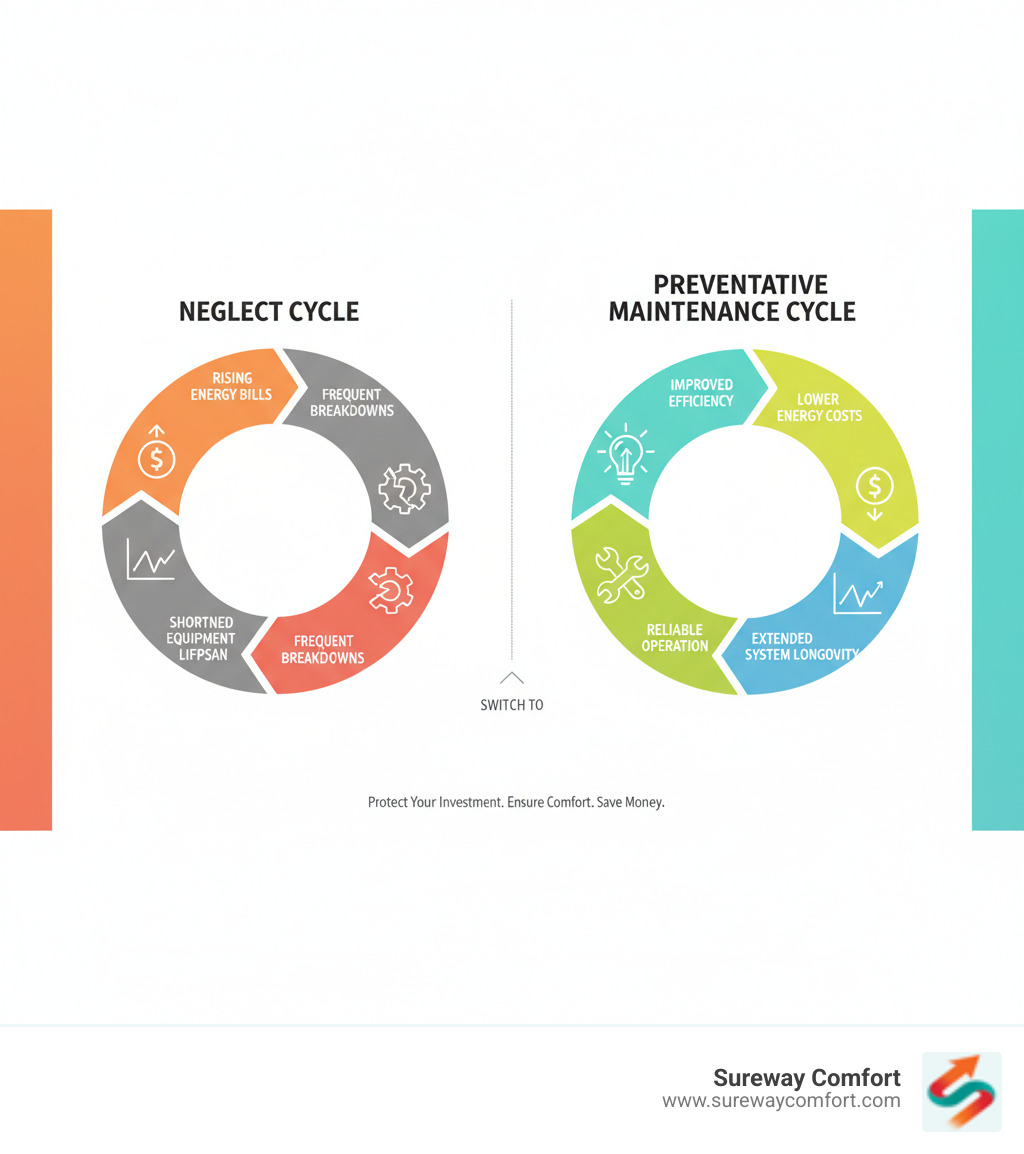
Preventative hvac maintenance terms simplified:
Why Preventative HVAC Maintenance is a Non-Negotiable for Homeowners
Your HVAC system isn't just another appliance in your home. It's the workhorse that keeps your family comfortable through Pennsylvania's sweltering summers and frigid winters. For homeowners in Bridgeville, South Fayette, Mt. Lebanon, and the surrounding areas, where the weather can flip from one extreme to another, a reliable heating and cooling system isn't a luxury—it's essential.
Here's the thing: preventative hvac maintenance isn't something you should consider getting around to "someday." It's a non-negotiable part of responsible homeownership. Regular maintenance protects your investment, safeguards your family's health, saves you money, and gives you peace of mind knowing your system won't quit on you during the coldest night of the year.
The difference between a well-maintained system and a neglected one is like night and day. One runs smoothly, efficiently, and reliably for decades. The other limps along, costs you more every month, and eventually leaves you scrambling for emergency repairs. The choice is clear: be proactive, not reactive. To learn more about comprehensive system care, check out more on maintaining your system.
Maximize Energy Efficiency and Lower Utility Bills
Let's talk about your energy bills. If they've been creeping up lately, your HVAC system might be the culprit. When your system runs inefficiently, it's like driving with the parking brake on—you're burning extra fuel to get nowhere fast.
Studies show that preventative hvac maintenance programs focused on energy efficiency can save homeowners between 5% and 20% on their energy bills, without requiring major upgrades or equipment replacements. That's real money back in your pocket, month after month, year after year.
So what causes inefficiency? Dirt and debris. When your air filters get clogged, your coils get coated in grime, and your airflow gets blocked, your system has to work overtime just to maintain the same temperature. It's like asking someone to run a marathon while breathing through a straw—exhausting and wasteful.
A dirty evaporator coil reduces heat exchange efficiency. Blocked airflow forces your blower motor to strain harder. Grimy condenser coils make your compressor work longer cycles. All of this adds up to higher energy consumption and higher bills.
Regular cleaning and tune-ups keep your system running at peak performance. Your equipment uses only the energy it needs, nothing more. And that efficiency translates directly to lower monthly utility costs and more money for the things that matter to you.
Extend Equipment Lifespan and Protect Your Investment
Your HVAC system is one of the biggest investments in your home. When properly maintained, these systems typically last between 15 and 25 years. But here's the catch: that lifespan depends almost entirely on how well you care for it.
Neglect your system, and you might be looking at replacement after just 10 years. Keep up with regular maintenance, and you could get 25 years or more of reliable service. That's potentially a decade of extra comfort from the same equipment.
Think of preventative hvac maintenance as preventative medicine for your system. During routine check-ups, technicians catch the small stuff—a loose belt here, a minor refrigerant leak there, a worn bearing that's starting to make noise. These little issues are easy and affordable to fix. But left alone, they turn into big, expensive problems that can damage other components or even destroy your entire system.
Regular maintenance reduces wear and tear on all your system's moving parts. Motors stay lubricated. Electrical connections stay tight. Refrigerant levels stay optimal. Everything works together smoothly instead of fighting against friction, corrosion, and deterioration.
Here's something many homeowners don't realize: most manufacturers require annual maintenance to keep your warranty valid. Skip those tune-ups, and you could void your warranty completely. That means if something major breaks, you're paying for the entire repair or replacement out of pocket. To make staying on schedule easier, consider one of our HVAC Maintenance Plans that takes the guesswork out of when to schedule service.
Improve Indoor Air Quality for a Healthier Home
Here's a sobering fact: the air inside your home can be significantly more polluted than the air outside. Your HVAC system is essentially your home's respiratory system, constantly circulating air and filtering out contaminants. But when it's not properly maintained, it becomes part of the problem instead of the solution.
Dirty air filters can't capture allergens, dust, pollen, and other particles effectively. Grimy coils become breeding grounds for mold and mildew. Neglected ductwork can harbor dust mites and distribute pollutants throughout every room. In fact, dirty ductwork can make your indoor air quality up to 100 times worse than outdoor air.
The health impacts are real. Poor indoor air quality aggravates allergies and asthma. It can trigger respiratory problems, headaches, fatigue, and dizziness. For children, elderly family members, or anyone with existing health conditions, contaminated air is especially concerning.
Mold growth on evaporator coils is particularly troublesome. The constant dampness creates the perfect environment for spores to multiply, and then your ventilation system distributes them throughout your home. Even more serious, poorly maintained systems can harbor bacteria that cause Legionnaire's Disease or accumulate Volatile Organic Compounds (VOCs) that contribute to skin allergies and other health issues.
Regular preventative hvac maintenance addresses all of these concerns. Clean or fresh air filters trap contaminants before they circulate. Cleaned coils don't harbor mold. Inspected ductwork stays clean and sealed. Your system delivers the clean, fresh air your family deserves to breathe every day.
Preventative vs. Reactive Maintenance: A Smart Choice
When it comes to HVAC care, you have two paths: plan ahead or panic later. We've seen both approaches, and trust us, one is infinitely better than the other.
| Feature | Proactive (Preventative) Care | Reactive Maintenance |
|---|---|---|
| Timing | Scheduled, planned appointments | Unexpected, emergency breakdowns |
| Cost | Predictable, often lower in the long run | Unpredictable, often higher (emergency fees, major repairs) |
| System Health | Consistent efficiency, extended lifespan, fewer issues | Rapid performance decline, shorter lifespan, frequent problems |
| Comfort | Reliable heating/cooling, consistent air quality | Periods of discomfort, potential health risks |
| Stress Level | Low, peace of mind | High, sudden inconvenience and financial strain |
| Warranty | Maintained | Potentially voided |
Reactive maintenance means waiting until something breaks before calling for help. It means no heat when it's 15 degrees outside. No air conditioning during a July heat wave. Emergency service calls. Higher repair costs. Stressed-out family members. And often, major component failures that could have been prevented with a simple tune-up.
Preventative hvac maintenance is the opposite. It's scheduled service at convenient times. It's catching problems when they're small and inexpensive to fix. It's knowing your system is ready for whatever weather comes your way. It's predictable costs instead of surprise bills. It's peace of mind instead of panic.
The choice really is that simple. You can invest a little time and money in regular maintenance, or you can gamble with your comfort, your family's health, and your wallet. We know which one makes more sense.
Ready to protect your home and avoid those emergency breakdowns? Contact us today to schedule your preventative maintenance service and experience the peace of mind that comes with a properly maintained system.
Your Complete HVAC Maintenance Checklist: DIY and Professional Tasks
Think about how you care for your car. You check the oil and tire pressure yourself, but when it's time for a tune-up or something sounds off, you head to a trusted mechanic. Your HVAC system works the same way. Some tasks are perfect for homeowners to handle, while others need the trained eye and specialized tools that only professional technicians bring to the table.
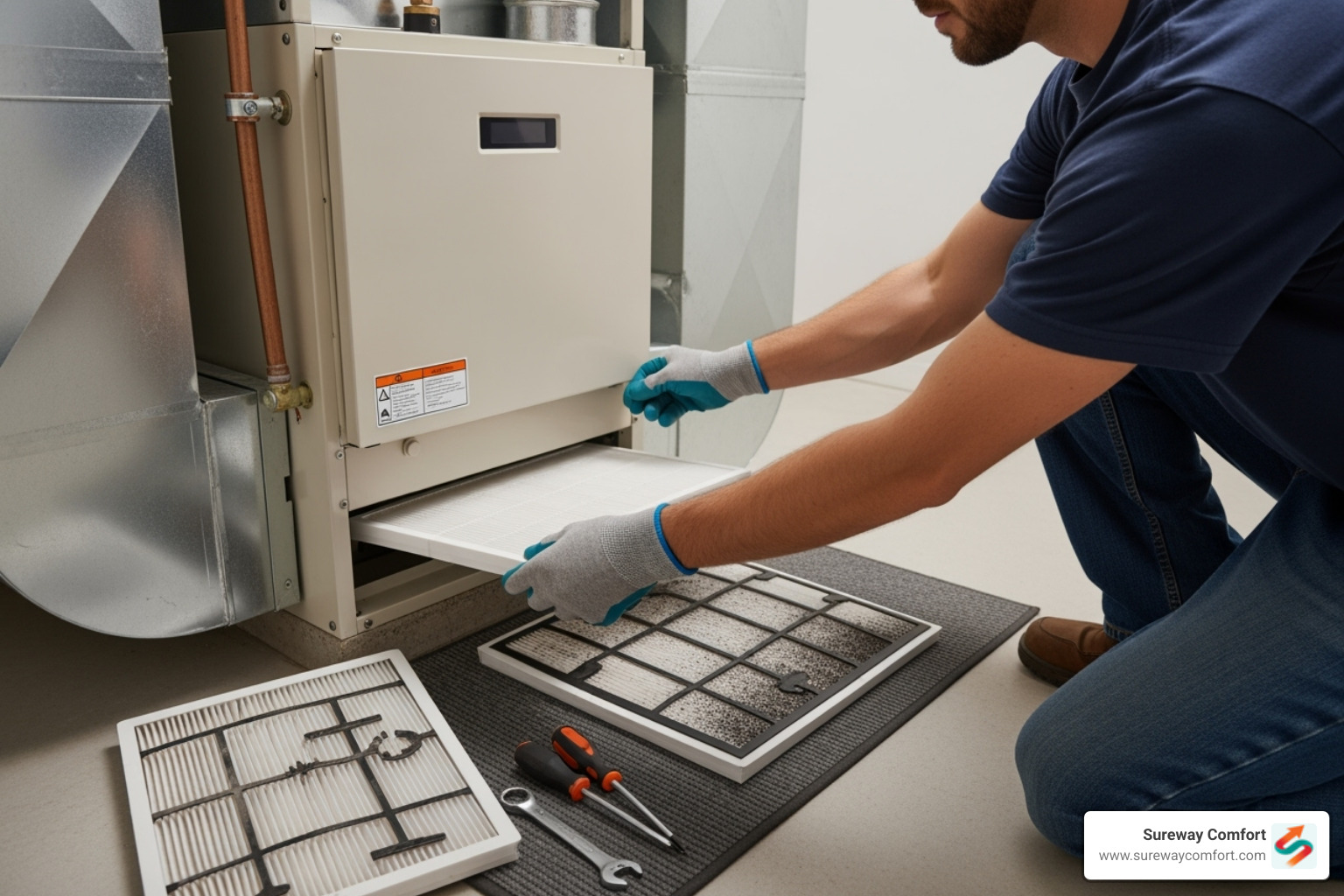
We believe in empowering you with the knowledge to keep your system healthy between professional visits. When you handle the basics and we take care of the technical work, your HVAC system gets the comprehensive care it needs to run efficiently year after year.
Essential DIY Preventative HVAC Maintenance Tasks
You don't need any special training to make a real difference in how well your system performs. A few simple tasks, done regularly, can prevent common problems and keep your energy bills in check. These are the homeowner essentials that form your first line of defense against breakdowns.
The most important task? Changing your air filters. We recommend checking your filter every month and swapping it out every one to three months. If you have pets, allergies, or notice a lot of dust in your home, you'll want to change them even more frequently. A clogged filter is like asking your system to breathe through a pillow—it restricts airflow, wastes energy, and can lead to dirty coils and premature wear. It's a simple five-minute job that makes a huge difference.
Your outdoor unit needs breathing room too. Once a month, take a quick walk outside and clear away any debris that's accumulated around your condenser unit. Leaves, grass clippings, dirt, and even spider webs can block airflow. Trim back any shrubs or plants to at least 18 inches away from the unit. When you notice the fins getting dirty, you can gently spray them down with a garden hose (just make sure the power is off first). This prevents dirt buildup that blocks airflow and reduces your system's ability to cool your home efficiently.
Inside your home, keep all your vents clear. It sounds obvious, but we've seen countless homes where furniture, drapes, or rugs block supply and return registers. This creates uneven temperatures and forces your system to work overtime. Take a few minutes to walk through your home and ensure every vent can breathe freely. While you're at it, vacuum and wipe down those vents to remove dust buildup.
Finally, check your thermostat settings regularly. Make sure it's set correctly for the season and consider programming it to adjust temperatures when you're away or sleeping. Just be careful where your thermostat is located—if it's near heat-producing appliances, lamps, or in direct sunlight, it might give inaccurate readings that cause your system to run inefficiently.
These straightforward tasks are your homeowner superpowers. They take minimal time and effort but deliver maximum results in system performance and longevity. For a comprehensive guide on seasonal maintenance tasks throughout the year, check out our article on Efficient HVAC Maintenance Year-Round.
What to Expect from a Professional Preventative HVAC Maintenance Tune-Up
While DIY tasks keep your system running smoothly day-to-day, professional tune-ups are where we catch the problems you can't see. Our certified technicians bring specialized tools, years of training, and a keen eye for detail to every visit. We're not just looking at the obvious stuff—we're diving deep into your system's components to identify potential issues before they become expensive emergencies.
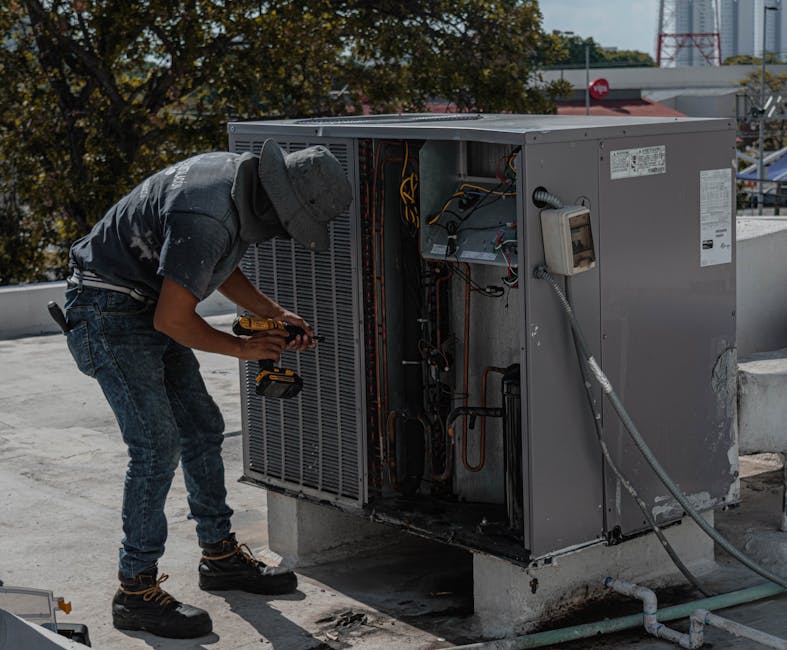
During a preventative hvac maintenance visit, we start by inspecting all electrical connections. Loose connections don't just reduce efficiency—they're a safety hazard. We'll tighten everything up and measure voltage and current on motors to ensure they're operating within safe parameters. Think of it as making sure your system's nervous system is firing on all cylinders.
Next, we focus on cleaning your evaporator and condenser coils. When these coils get dirty, your system loses its ability to transfer heat effectively. It's like trying to warm up by wearing a coat covered in mud—it just doesn't work as well. Clean coils restore your system's efficiency and reduce how long it needs to run to keep your home comfortable.
Lubrication of moving parts is another critical step. Your blower motor and other components have parts that move constantly, creating friction. Proper lubrication reduces that friction, which means less electricity usage and longer-lasting components. It's basic maintenance that prevents premature wear and tear.
We'll also check your refrigerant levels. Too much or too little refrigerant severely impacts your system's performance and drives up your energy bills. We'll measure the levels precisely and adjust if needed, while also inspecting for any leaks that could cause problems down the road.
Clearing your condensate drain might not sound exciting, but it's crucial. A clogged drain can cause water damage to your home, create humidity problems, and even shut down your system completely. We'll make sure water flows freely through the drain line so you never have to worry about indoor flooding.
Safety is paramount, so we test all safety controls to ensure they're functioning correctly. Your system has built-in safeguards to prevent hazards like overheating or gas leaks. We'll verify that these controls respond properly and keep your family safe. For heating systems, this includes checking gas connections, gas pressure, burner combustion, and the heat exchanger—because improper operation isn't just inefficient, it's dangerous.
We'll inspect and adjust your blower components to ensure proper airflow throughout your home. Even small adjustments here can make a noticeable difference in comfort and efficiency. We'll also test your thermostat to confirm it's accurately sensing temperatures and cycling your system on and off at the right times.
Finally, we'll conduct a visual inspection of accessible ductwork, looking for leaks that waste conditioned air. If we spot any issues, we'll let you know and recommend sealing to improve your system's overall efficiency.
Our goal isn't just to fix what's broken—it's to prevent things from breaking in the first place. By thoroughly checking these components during every visit, we help your system run more efficiently, last longer, and keep your Bridgeville home safe and comfortable year-round. For more details on what our comprehensive system checks include, visit our HVAC System Check page.
Ready to schedule your professional tune-up? Contact our expert team today to keep your HVAC system in peak condition.
Frequently Asked Questions About HVAC Care
We get it – your HVAC system isn't exactly the most exciting topic to think about. But when it stops working on the coldest night of the year or during a sweltering July afternoon, it suddenly becomes very important! Over the years, we've heard the same questions and concerns from homeowners throughout Bridgeville, McDonald, Bethel Park, and the surrounding communities. Let's tackle some of the most common ones so you can feel confident about caring for your system.
How often should I schedule professional HVAC maintenance?
Here's the simple answer: twice a year. Think of it like going to the dentist – you wouldn't skip your six-month cleanings and expect perfect teeth, right? Your HVAC system needs that same consistent attention to stay healthy and perform at its best.
The timing matters, too. We recommend scheduling your preventative hvac maintenance in the spring for your cooling system and in the fall for your heating system. This seasonal approach makes perfect sense when you think about it. You want your air conditioner inspected and tuned up before it has to work overtime keeping you cool all summer long. Similarly, your furnace or heat pump deserves a thorough check-up before winter's cold arrives and you're relying on it every single day.
This biannual schedule does more than just keep your system running smoothly. It helps us catch potential problems before they turn into emergency breakdowns, keeps your manufacturer's warranty valid, and ensures you're not left sweating or shivering when you need comfort most. For more guidance on preparing your system for seasonal changes, check out our Seasonal HVAC Tune-Up guide.
What are the consequences of neglecting HVAC maintenance?
Let's be honest – it's easy to forget about your HVAC system when it's quietly doing its job in the background. But ignoring it is like ignoring that "check engine" light in your car. Eventually, something's going to give, and it won't be pretty.
Sudden system failure is the nightmare scenario nobody wants. That minor issue you didn't know about? It can snowball into a complete breakdown, leaving you without heat in January or AC in August. And trust us, HVAC companies get very busy during those extreme weather days, so you might be waiting a while for help.
Your energy bills start creeping up when your system isn't maintained. Without proper annual care, heating and cooling systems typically lose at least 5% of their efficiency each year. That means your system is working harder and harder to do the same job, and you're paying for all that wasted energy. Over time, those extra costs really add up.
Then there's your indoor air quality. A neglected system becomes a breeding ground for dust, allergens, and even mold. All those nasty particles get recirculated throughout your home, making the air you breathe less healthy. For family members with allergies or respiratory issues, this can make daily life pretty uncomfortable.
But perhaps most concerning are the safety hazards. A cracked heat exchanger in a gas furnace can leak carbon monoxide – an odorless, colorless gas that's extremely dangerous. Faulty electrical connections can create fire risks. These aren't just inconveniences; they're genuine threats to your family's safety.
Don't forget about your warranty, either. Many manufacturers require documented annual maintenance to keep your equipment warranty active. Skip those tune-ups, and you might find yourself paying out-of-pocket for repairs that should have been covered. And ultimately, all this neglect leads to a shorter equipment lifespan, forcing you into an expensive replacement years earlier than necessary.
What are common signs my system needs a check-up?
Your HVAC system is pretty good at telling you when something's wrong – you just need to know what to listen and look for. These warning signs are your system's way of asking for help before things get worse.
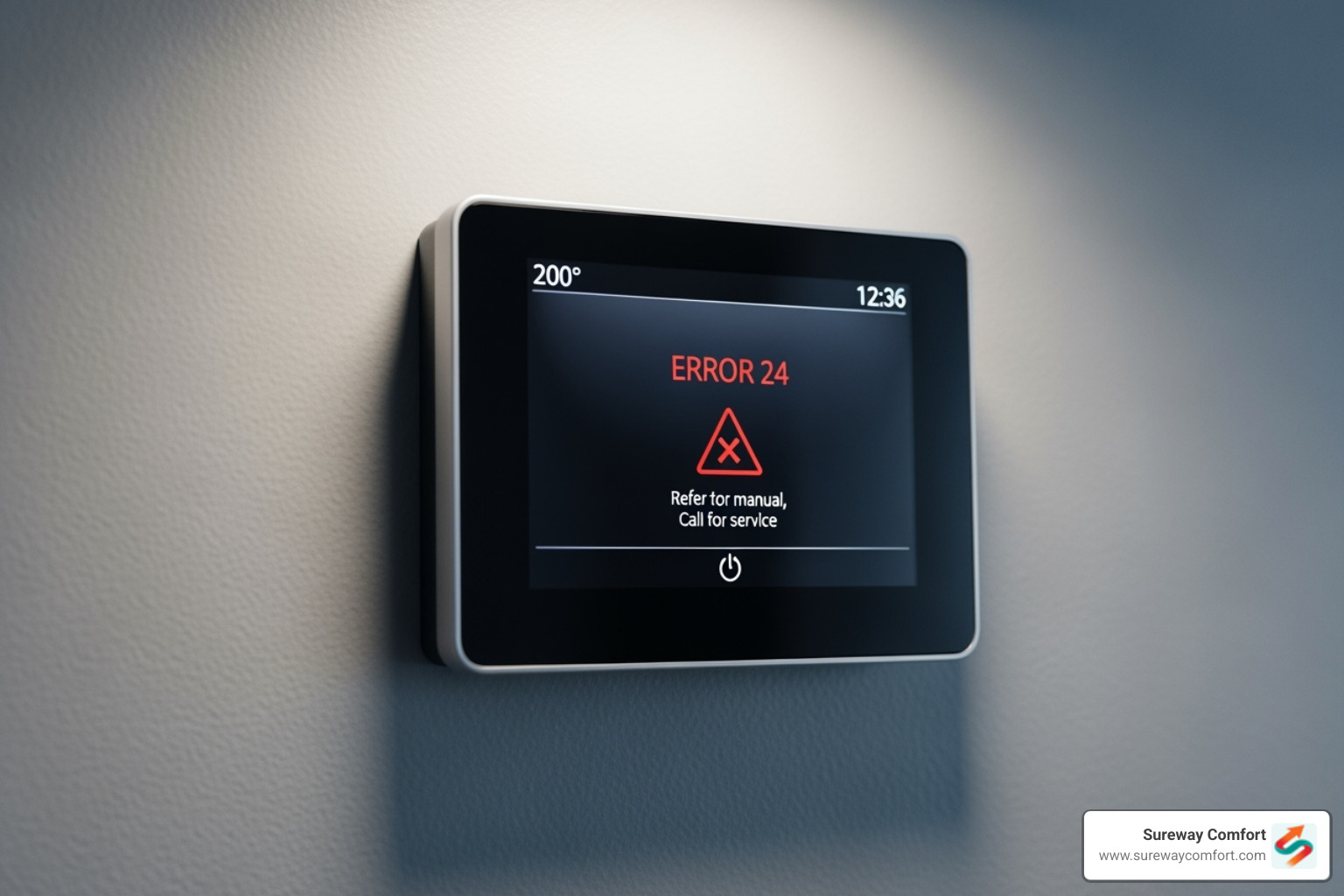
Unusual noises are often the first red flag. Your system has a normal operating hum you're probably used to hearing. But if you start noticing banging, screeching, grinding, hissing, or bubbling sounds, something's definitely off. Screeching often means motors or belts are worn or stiff, while grinding suggests ball bearings might be worn out. Hissing or bubbling? That could be a refrigerant leak.
Strange odors should never be ignored. A sulfur or rotten egg smell means you might have a natural gas leak – leave your home immediately and call your utility company. A burning smell could just be dust burning off when you first fire up your furnace for the season, but it might also signal an electrical problem. Musty odors typically point to mold or mildew growing somewhere in your system or ductwork.
Have you noticed uneven temperatures throughout your home? If your bedroom feels like an icebox while your living room is sweltering, your system isn't distributing air properly. This could be blocked vents, ductwork issues, or a struggling blower motor.
Frequent cycling – when your system turns on and off repeatedly in short bursts – is another telltale sign. This "short cycling" means your system is struggling to reach your desired temperature. It could be an improperly sized unit, a dirty filter, or refrigerant issues. Whatever the cause, it's wasting energy and wearing out your equipment faster.
Keep an eye on those rising utility costs, too. If your energy bills are climbing without any change in how you use your system, it's likely losing efficiency and working overtime to keep you comfortable. And if you're noticing weak airflow from your vents, you might have a clogged filter, blower motor problems, or ductwork issues.
The bottom line? Don't wait for a complete breakdown. If you notice any of these warning signs, give us a call. A timely check-up can often diagnose and fix the issue quickly and affordably, saving you from a much bigger headache down the road. Contact our expert team to schedule your maintenance service and get peace of mind.
Conclusion: Partner with an Expert for Year-Round Peace of Mind
Think back to everything we've covered about preventative hvac maintenance. It's more than just another item on your home maintenance to-do list. Regular care translates directly into real savings on your energy bills, a system that lasts years longer than a neglected one, cleaner air for your family to breathe, and the confidence that your heating and cooling will be there when you need it most.
Your HVAC system is a long-term investment in your home's comfort and value. Like any significant investment, it deserves consistent attention and expert care. The difference between a system that serves you reliably for twenty years and one that fails prematurely often comes down to whether it received regular professional maintenance.
We understand that life gets busy. Between work, family, and everything else on your plate, it's easy to forget about your HVAC system – especially when it's quietly doing its job. That's exactly why partnering with a trusted local expert makes all the difference. At Sureway Comfort, we've built our reputation on providing homeowners throughout Bridgeville, South Fayette, Upper St. Clair, Mt. Lebanon, McDonald, Scott Township, Canonsburg, and Bethel Park with the reliable, professional service they deserve.
Our experienced technicians know Pennsylvania's climate and understand exactly what your system needs to handle our hot summers and cold winters year after year. We're not just here to fix problems; we're here to prevent them from happening in the first place.
Don't wait until you're facing an emergency repair on the coldest night of the year or the hottest afternoon of summer. Take control of your home's comfort and efficiency today. Contact our expert team to schedule your preventative maintenance service and experience the peace of mind that comes with a well-maintained HVAC system. Your future self – and your wallet – will thank you.



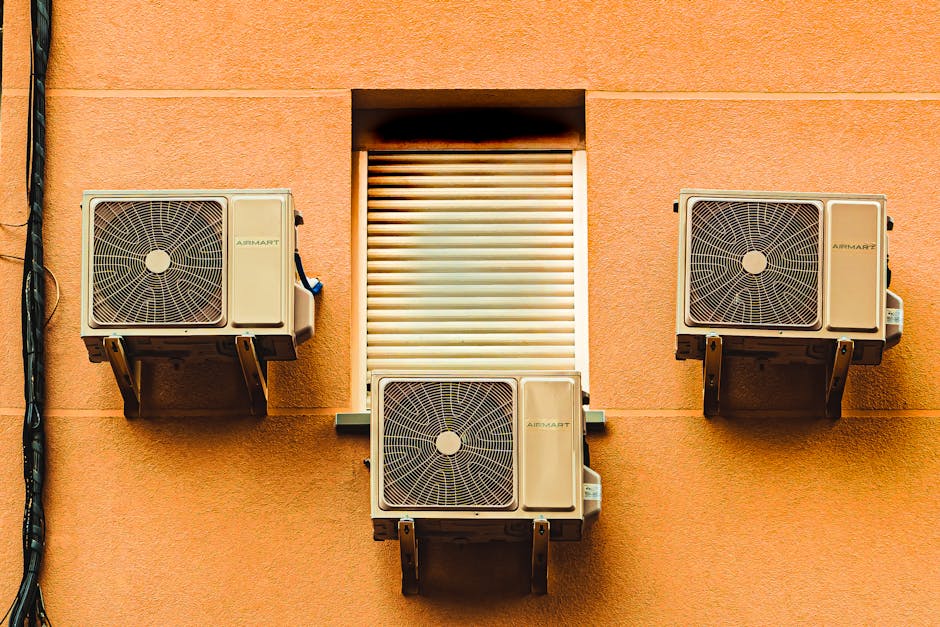
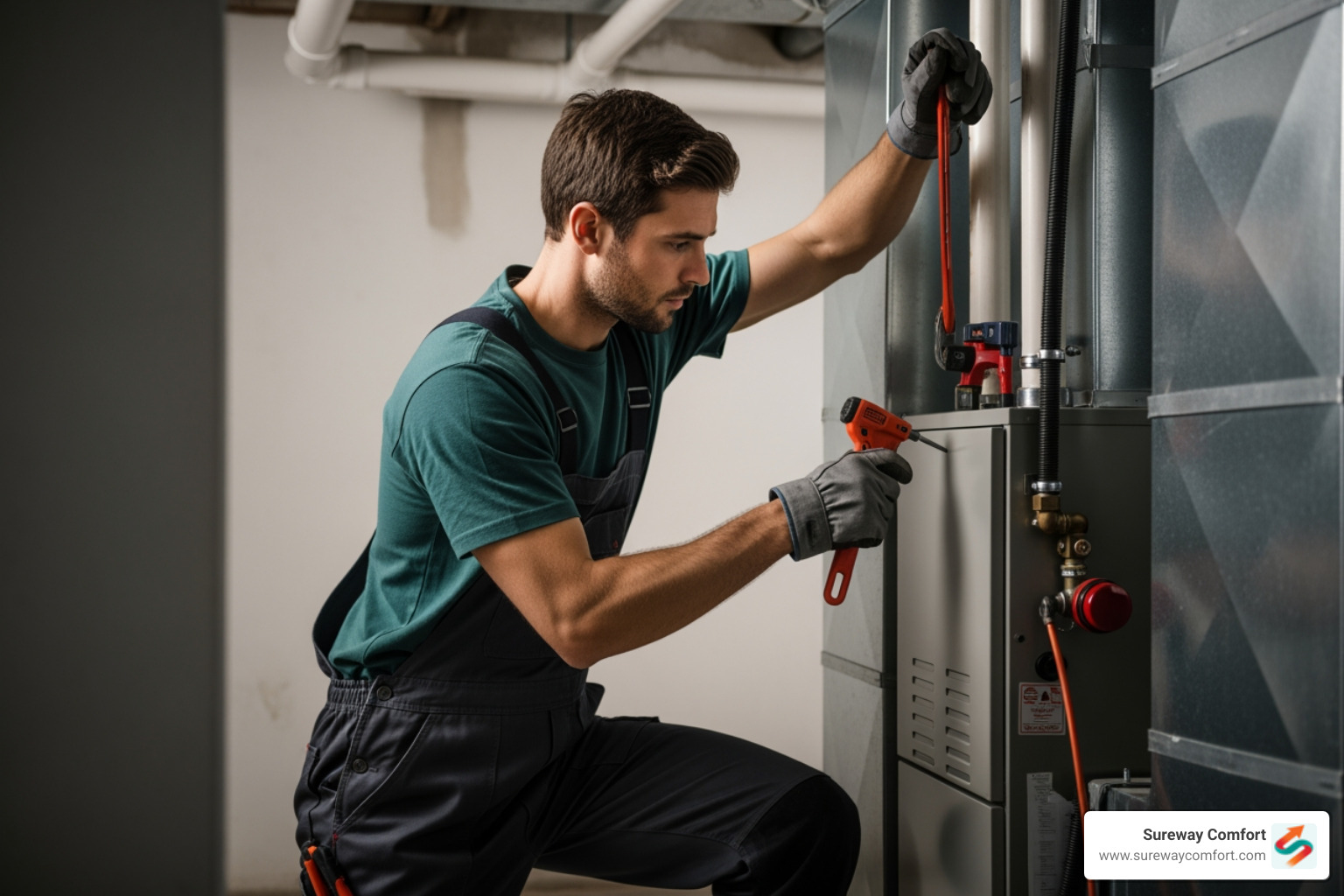

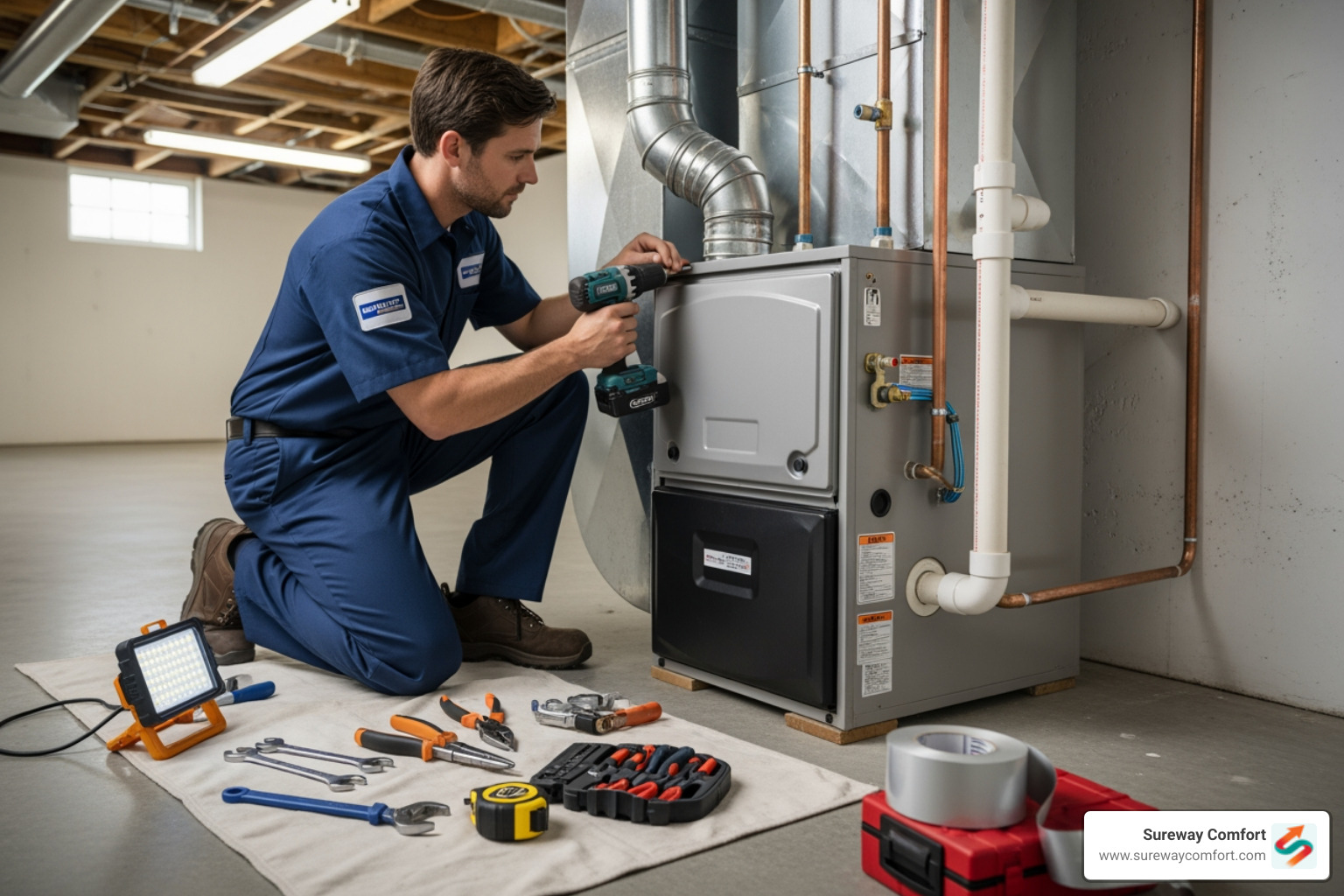
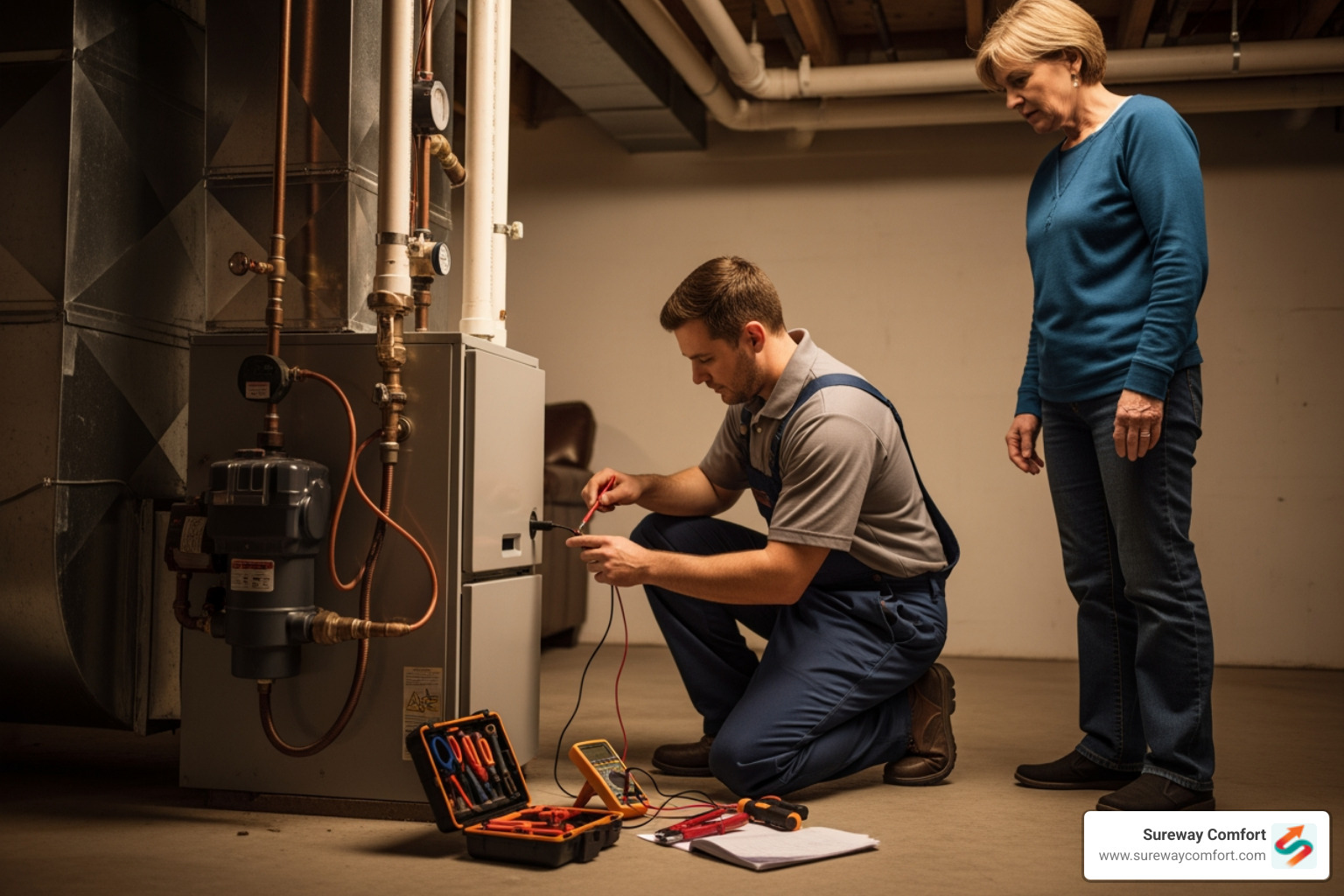




















.avif)



